|
|
|
Sort Order |
|
|
|
Items / Page
|
|
|
|
|
|
|
| Srl | Item |
| 1 |
ID:
099469
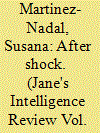

|
|
|
| 2 |
ID:
151503
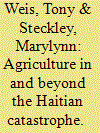

|
|
|
|
|
| Summary/Abstract |
Although the devastation from Haiti’s 2010 earthquake was concentrated in Port-au-Prince, it had deep agrarian roots. This paper situates Haiti’s urban poverty in the chronic exploitation of the country’s peasant classes as a basis for assessing the competing contemporary visions for agricultural development. We argue that the post-earthquake reconstruction has fortified a neoliberal development that is incompatible with the aspirations of the Haitian peasantry. Given the interrelated power of domestic elites and international donors, and the proliferation of disconnected development projects, we conclude that any prospect for pro-poor development hinges on the growth and collaboration of peasant movements.
|
|
|
|
|
|
|
|
|
|
|
|
|
|
|
|
| 3 |
ID:
170217
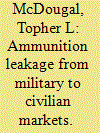

|
|
|
|
|
| Summary/Abstract |
The increase in the accessibility of firearms and ammunition represents a key factor of destabilization in many countries. It is also commonly associated with an escalation in intensity and organization of collective and interpersonal violence. In some cases, arms are illegally transferred via diversion from existing stores. In this article, we consider the leakage from military to civilian markets as an important source of ammunition available to civilians in Haiti. We employ a unique section-quarterly panel of ammunition prices on the Haitian civilian market over the period July 2004–July 2012. These data are combined with publicly available monthly data on authorized ammunition shipments to the country registered by the United Nations (UN) and Haitian National Police (HNP). We use a standard time-series Ordinary Least Squares (OLS) model to show that the exogenous shocks of UN- and HNP-ordered ammunition exert measurable downward pressure on civilian ammunition markets, which we calculate in terms of adjusted predictions and partial elasticities of demand. These effects constitute econometric evidence that the firewall that should in theory have separated military and civilian markets in Haiti partially broke down. We conclude with a suggestion for using this model to help estimate the specific size of the leakage.
|
|
|
|
|
|
|
|
|
|
|
|
|
|
|
|
| 4 |
ID:
151298
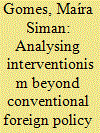

|
|
|
|
|
| Summary/Abstract |
Most of the analysis dealing with so-called “emerging powers” in the field of peace and security seek to explain the intentions and motivations (supposedly) behind these states’ foreign policy and changing normative positions. Several of those studies see foreign policy decisions as the result of rational processes, defined by a “means-and-ends” logic, essentially oriented by preconceived national interests, clear ideational precepts and fixed identities. Through a non-conventional analysis of the participation of Brazil in the United Nations Stabilization Mission in Haiti (MINUSTAH), the paper aims to advance an understanding of foreign policy as an identity practice that, especially in moments of domestic identity crisis, helps reinforce and stabilize specific representations of the state self and of those acting in its name. Informed by a post-positivist approach, the case discussed in the paper opens some avenues to explore how interventionism can be analysed beyond traditional foreign policy rationales and mainstream international relations theories.
|
|
|
|
|
|
|
|
|
|
|
|
|
|
|
|
| 5 |
ID:
067815
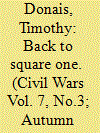

|
|
|
| 6 |
ID:
105369
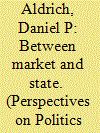

|
|
|
|
|
| Publication |
2011.
|
| Summary/Abstract |
Developed and developing nations alike face low-probability but high-consequence exogenous shocks, including ice storms, chemical spills, terrorist attacks, and regional blackouts. Recently, "natural" disasters have dominated the airwaves; mega-catastrophes that claim more than 1,000 lives have become an almost yearly occurrence. In 2010, the Haiti and Chile earthquakes killed more than 200,000 people between them and felt all too familiar to many observers in the West. Before them were Cyclone Nargis in Burma, which took 130,000 lives in 2008; Hurricane Katrina, which killed more than 1,500 New Orleans residents and left 80% of the city flooded in 2005; and the Indian Ocean tsunami, which claimed roughly a quarter of a million lives in India, Indonesia, Sri Lanka, and Thailand in 2004.
|
|
|
|
|
|
|
|
|
|
|
|
|
|
|
|
| 7 |
ID:
166785
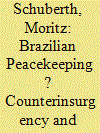

|
|
|
|
|
| Summary/Abstract |
Brazil’s role in UN peacekeeping operations has been subject to increasing attention from academics and policy makers alike. While some authors praise Brazil’s engagement in the United Nations Stabilization Mission in Haiti (MINUSTAH) as a case of innovative South-South cooperation, others accuse Brazil of using Haiti as a ‘testing ground’ for repressive anti-gang tactics that have subsequently been introduced at home. This article challenges these two dominant views on Brazil’s role in Haiti. Based on a period of six months of fieldwork in Port-au-Prince and interviews with key Brazilian actors, the article draws a parallel between MINUSTAH’s military raids in gang-ruled neighbourhoods coupled with police reform in Haiti, on one hand, and the Pacifying Police Units (Unidade de Polícia Pacificadora) plus the accompanying UPP Social in Rio de Janeiro, on the other hand. It is argued that Brazil’s peacekeeping strategy, at home and abroad, is a mix of coercive and cooperative measures reminiscent of counterinsurgency (COIN) tactics already employed during the French colonial war in Algeria. Moreover, it is shown that policing techniques borrowed from the US are employed to ease the tension between carrots and sticks, notably so in the urban environment in which Brazilian peacekeeping is taking place.
|
|
|
|
|
|
|
|
|
|
|
|
|
|
|
|
| 8 |
ID:
105085
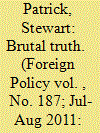

|
|
|
|
|
| Publication |
2011.
|
| Summary/Abstract |
The last 20 years -- so blandly labeled the "post-Cold War era" -- might as well be known as the "Age of Failed States." After decades of confronting Soviet power, successive U.S. administrations suddenly became embroiled in and bedeviled by the world's most dysfunctional countries. Although great-power competition persists, it is often the world's basket cases -- from Somalia to Afghanistan, Haiti to Liberia, and Pakistan to Yemen -- that dominate the U.S. foreign-policy agenda. This trend began in the early 1990s, when a shocking outbreak of state collapse and internal violence, including but by no means limited to episodes of genocide in the former Yugoslavia and Rwanda, seemed to herald a "new world disorder," in the words of British diplomat David Hannay.
|
|
|
|
|
|
|
|
|
|
|
|
|
|
|
|
| 9 |
ID:
126516
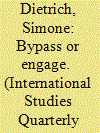

|
|
|
|
|
| Publication |
2013.
|
| Summary/Abstract |
The conventional wisdom in the literature on aid allocation suggests that donors utilize bilateral aid as a tool to buy influence in the aid-receiving country. Those who conclude that aid is driven by donor self-interest focus on government-to-government aid transfers. However, this approach overlooks important variation in delivery tactics: Bilateral donors frequently provide aid to nonstate actors. This paper argues that donors resort to delivery tactics that increase the likelihood of aid achieving its intended outcome. In poorly governed recipient countries, donors bypass recipient governments and deliver more aid through nonstate actors, all else equal. In recipient countries with higher governance quality, donors engage the government and give more aid through the government-to-government channel. Using OLS and Probit regressions, I find empirical support for this argument. Understanding the determinants of donor delivery tactics has important implications for assessing aid effectiveness.
|
|
|
|
|
|
|
|
|
|
|
|
|
|
|
|
| 10 |
ID:
098756
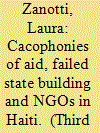

|
|
|
|
|
| Publication |
2010.
|
| Summary/Abstract |
The January 2010 earthquake in Haiti was a catastrophe not only for the loss of life it caused, but also because it destroyed the very thin layer of state administrative capacity that was in place in the country. This article argues that the fragility of the Haitian state institutions was exacerbated by international strategies that promoted NGOs as substitutes for the state. These strategies have generated a vicious circle that, while solving immediate logistical problems, ended up weakening Haiti's institutions. However, the article does not call for an overarching condemnation of NGOs. Instead, it explores two cases of community-based NGOs, Partners In Health and Fonkoze, that have contributed to creating durable social capital, generated employment and provided functioning services to the communities where they operated. The article shows that organisations that are financially independent and internationally connected, embrace a needs-based approach to their activities and share a long-term commitment to the communities within which they operate can contribute to bringing about substantial improvement for people living in situations of extreme poverty. It concludes that in the aftermath of a crisis of the dimension of the January earthquake it is crucial to channel support towards organisations that show this type of commitment.
|
|
|
|
|
|
|
|
|
|
|
|
|
|
|
|
| 11 |
ID:
007558
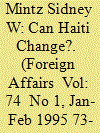

|
|
|
|
|
| Publication |
Jan-Feb 1995.
|
| Description |
73-86
|
|
|
|
|
|
|
|
|
|
|
|
|
|
|
|
| 12 |
ID:
160800
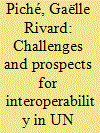

|
|
|
|
|
| Summary/Abstract |
Interoperability is central to UN peace operations. These operations are civilian-led enterprises that pursue complex objectives, which often can only be achieved through the close collaboration of civilian, police, and military actors. As a result, coordination and interoperability between civilian and uniformed personnel in peace operations is not only desirable but often necessary to the success of these missions. Yet, interoperability is not a given. Peace operations face important challenges that can undermine the ability of their different components to work effectively together towards common objectives. Based on observations made during field research in Haiti and time spent at the UN headquarters in New York City, this essay discusses the challenges faced by peace operations in regard to interoperability, factors that facilitate interoperability, and implications for Canada’s announced return to peacekeeping.
|
|
|
|
|
|
|
|
|
|
|
|
|
|
|
|
| 13 |
ID:
100302
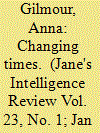

|
|
|
| 14 |
ID:
122240
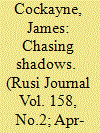

|
|
|
|
|
| Publication |
2013.
|
| Summary/Abstract |
Experience of conflict over the last two decades - from Haiti to Liberia to Afghanistan - points towards the likelihood that armed groups will adopt criminal strategies as a way of maintaining power during and after conflict, exploiting the state's vulnerability. However, policy responses have yet to prove effective in dealing with this threat. James Cockayne explores the relationship between criminal groups and political power, debunking longheld myths that such groups are primarily economic actors, before considering how a more strategic, evidence-based approach to tackling organised crime in conflict-affected states might be developed and implemented.
|
|
|
|
|
|
|
|
|
|
|
|
|
|
|
|
| 15 |
ID:
075851
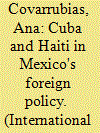

|
|
|
| 16 |
ID:
014829
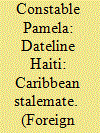

|
|
|
|
|
| Publication |
Winter 1992-93.
|
| Description |
175-190
|
|
|
|
|
|
|
|
|
|
|
|
|
|
|
|
| 17 |
ID:
114743
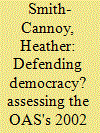

|
|
|
|
|
| Publication |
2012.
|
| Summary/Abstract |
Inter-governmental organizations (IGOs) have vastly different capacities for intervening in conflicts in their member states. The Organization of American States (OAS), a regional IGO in Latin America, has the capacity to intervene diplomatically to defend democracy in the hemisphere. This article examines how well the OAS applied these diplomatic tools in defense of democracy in Haiti following the 2000 political crisis. I argue that the OAS achieved some success in Haiti, particularly the Electoral Technical Program. However, the bulk of the evidence suggests that the OAS missed key opportunities to invoke their strongest diplomatic tools in defense of democracy in Haiti.
|
|
|
|
|
|
|
|
|
|
|
|
|
|
|
|
| 18 |
ID:
124578
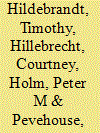

|
|
|
|
|
| Publication |
2013.
|
| Summary/Abstract |
The debate around humanitarian intervention and the responsibility to protect generally concerns a collective action problem on the international level: motivating states to participate in a multilateral coalition to stop a mass atrocity. This debate presupposes that states enjoy a domestic consensus about their rights and responsibilities to intervene. This article reconsiders this assumption and examines the sources of domestic political will for intervention, particularly the role of partisanship, ideology, and public opinion on Congressional members' willingness to support US intervention for humanitarian purposes. We analyze several Congressional votes relevant to four episodes of US humanitarian intervention: Somalia, Haiti, Bosnia, and Kosovo. We find that public support for humanitarian intervention increases Congressional support and that other political demands, primarily partisanship and ideological distance from the president, often trump the normative exigencies of intervention. Our findings shed light on the domestic political dynamics behind humanitarian intervention and can help explain why some recent humanitarian missions have proceeded without seeking Congressional approval.
|
|
|
|
|
|
|
|
|
|
|
|
|
|
|
|
| 19 |
ID:
102167
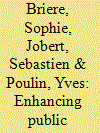

|
|
|
| 20 |
ID:
163076
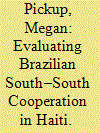

|
|
|
|
|
| Summary/Abstract |
I focus on evaluating Brazilian development and humanitarian cooperation in Haiti to answer how emerging providers such as Brazil are contributing to global development through cooperation. The paper establishes criteria for evaluation, arguing that global standards for aid effectiveness need to be expanded. I argue that when assessed on ownership, efficiency and sustainability, cooperation holds several advantages and limits, such as misplaced assumptions that Brazil’s approach is appropriate elsewhere. The discussion is rooted in the context of Haiti in order to underline how outcomes are not pre-determined, but rather depend on the model’s interaction with the partner context.
|
|
|
|
|
|
|
|
|
|
|
|
|
|
|
|
|
|
|
|
|